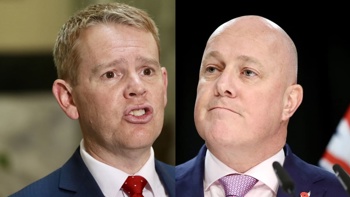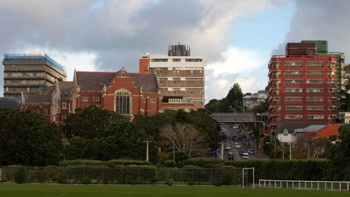The Government is dropping the last of its Covid restrictions just as reported cases and hospitalisations are trending back up.
Most Covid-19 rules were dropped a year ago, including the vaccine mandates, as the virus infected all corners of the country and New Zealanders moved to the inevitable phase of living with it.
In April, Cabinet reviewed the seven-day isolation rule and mandatory mask-wearing in most healthcare settings, and decided to keep them until the end of August to help ease the pressure on hospitals during the onset of winter.
At the post-Cabinet press conference today, Prime Minister Chris Hipkins and Health Minister Ayesha Verrall announced that the last masking mandate and isolation requirements will be lifted at midnight tonight.
There will instead be a recommendation to isolate for five days if you’ve tested positive.
”While not mandated, the Ministry of Health guidance is to stay at home for five days if you’re unwell or have tested positive,” Verrall said.
This followed public health advice that the risk from Covid-19 was low and it was now safe to remove the final requirements, she said.
”While our case numbers will continue to fluctuate, we have not seen the dramatic peaks that characterised Covid-19 rates last year.
”Case rates, wastewater levels and hospitalisations have been trending downwards since the beginning of June, she said. Over the past month reported COVID-19 cases have hit their lowest levels since February 2022.
Covid had put considerably less pressure on the health system this winter and other illnesses have been better planned for and managed, Verrall said.
Covid-19 accounted for 2.2 per cent of hospital admissions this morning, and New Zealand has now likely passed the winter influenza peak.
She said mask-wearing remained an important way to prevent the spread of respiratory illnesses.
Hipkins acknowledged the significant milestone, “the formal end of what was a uniquely challenging time for the country”.
The prime minister referenced the unity of the response and the sacrifices made by Kiwis that saved thousands of lives.
“All of those people were loved,” Hipkins said of the people who died with Covid as the main contributing factor.
There was “no sugarcoating” how difficult Covid-19 had been for New Zealand, he said, referencing lockdowns. He highlighted Auckland and the toll Aucklanders undertook through multiple lockdowns.
“Out of adversity came strength and that is the Kiwi way,” he said.
The remaining restrictions were the final act in New Zealand’s Covid response, Hipkins said. He awaited the result of the inquiry into the response.
He paid tribute to those who planned the response and the health workers who facilitated it.
Hipkins confessed that there were times in the past that he had longed for this day and paid respect to those who joined him in leading the response, a nod to former PM Jacinda Ardern and former Director General of Health Dr Ashley Bloomfield.
Asked if this was linked to the timing of the election, Hipkins said the government signalled that the previous extension of the restrictions would likely be the last one.
Health Minister Dr Ayesha Verrall said this winter had been more stable than last year, proving the immunity gained through vaccination.
Hipkins acknowledged there would be concern about the dropping of restrictions.
Verrall said the lesson we all learned was that people had different levels of vulnerability. She said it was on all of us to consider our actions, such as when we visit hospitals or rest homes. Verrall stated masks would be recommended when visiting hospitals but not mandated.
Hipkins said the duration of the last lockdown in Auckland was probably one of the decisions he would change, looking back.
He noted introducing mandates did create a level of division in society but claimed it contributed to a lower mortality rate.
Hipkins said he certainly hoped it would be his last Covid-19 press conference.
Hipkins said it was a matter for employers to decide whether they welcomed people who had lost their job because they weren’t vaccinated. People would still need to be vaccinated for particular roles within Te Whatu Ora.
Verrall said public health advice indicated the burden of keeping mandates did not justify keeping them.
“This winter has been considerably better than last winter,” Verrall said, noting there were more surgeries happening now.
Verrall was in Tairawhiti last week meeting with healthcare staff and said there was still a tail of catch-up following Cyclone Gabrielle. She said it was still recommended to stay home for five days, but it was not mandated. She recommended testing and anti-virals.
On reported issues with staffing on the South Island’s West Coast, Verrall said shifts needed to be made towards sustainable staffing practices to ensure people could access healthcare.
Verrall said New Zealand’s excess mortality was more stable than other countries, even with fewer restrictions than the country has had.
‘Missed opportunity’ to build on pandemic lessons
Otago University epidemiologist Professor Michael Baker said today’s decision was a “missed opportunity” to build on what he saw as one of the pandemic’s key lessons.
”That is, if you’re sick with a respiratory illness, you need to take responsibility and isolate yourself, and it’s not okay just to go to work, school or social events and infect others.”
Baker said that wasn’t just a consideration for Covid-19, but all respiratory infections.
”The thing I’d like to know now is, what do we substitute for this?” he said.
”If we’re not going to have it as a legal requirement, I think it’s an opportunity to work with relevant institutions - such as employers, schools or people operating social venues - to actually encourage this behaviour of not attending places if you are sick.
”Swimming pools have signs saying not to swim if you have gastroenteritis symptoms and this is the same concept. It’s just that we’ve been very selective about applying it.”
Covid-19 modeller Professor Michael Plank said the decision was a “reasonable move” at this stage in the pandemic.
Considering the range of infectious diseases in our community, Plank said that, increasingly, it “doesn’t really make sense to single out Covid and treat it differently with legal mandates”.
Plank, of Covid-19 Modelling Aotearoa, also expected that keeping the isolation mandate for Covid-19 would likely have only “marginal” benefits on overall infection rates in the long term.
”I think they took a cautious approach, going into winter of extending [the seven-day isolation] mandate, because of course, there was a concern that we might get a significant Covid wave coinciding with the winter flu season,” Plank said.
”The worst of the flu season is probably behind us now, and Covid levels are relatively now, so it’s a reasonable thing to do at this stage.”
But he added that didn’t mean people should go to work or school if they were sick.
Cases and hospitalisations on the rise
A year ago daily case numbers were running at nearly 7000, amid a winter wave that left thousands of Kiwis in hospital with the virus.
The latest weekly Covid statistics show 5372 new cases - half of them reinfections - in the week to August 13, an increase of 763 cases from the previous seven-day rolling average. This follows an increase for the week to August 6, when there were 659 more cases.
As of August 13, there were 171 cases in hospital (11 more than the previous week) including four in ICU (down from five), with three deaths in the past week, bringing the total number of deaths attributable to Covid to 3249.
Reporting on the previous week, a Ministry of Health summary said: “Reported case rates for the week ending August 6 have increased for the first time since the end of May 2023. In the week ending July 30, hospital admissions, viral RNA in wastewater, and mortality decreased or remained stable compared to the previous week.”
The seven-day rolling average of reported case rates was 12.6 per 100,000 people for the week ending August 6, up from 9.9 per 100,000 people for the previous week - or a 27 per cent increase.
The hospitalisation rate over the same period dropped from 0.43 to 0.40 per 100,000 people, while the mortality rate was stable at 0.03 per 100,000 people - though both of those rates increased in the last week.
How much the case rates tell us, though, is questionable, given how they’re thought to be a fraction of the reality - as little as one in four actual infections - due to how few people are now testing and reporting a positive result.
A report in April by Covid-19 Modelling Aotearoa showed that if the isolation rules were axed, hospitalisations and deaths could rise by between 13 to 25 per cent over six months if the Government ended mandatory isolation for Covid cases.
But that does not appear to have happened, with hospital numbers and the amount of Covid in wastewater declining in recent months.
Covid-19 modeller Professor Michael Plank said last month that case numbers were low because there might be less virus circulating in communities, probably due to high population immunity.
“If we look at hospital numbers, they’re almost at an all-time low since Omicron arrived as well – and we can see that the level of virus being detected using wastewater surveillance is also at a very low level,” Plank said at the time.
One of the remaining major uncertainties from the global pandemic is how many people will have Long Covid, and what pressure that will put on the health system.
The Ministry of Health has said it’s not possible to quantify just how many people are living with the post-viral condition today.
A constellation of persisting symptoms thought to accompany 10 to 20 per cent of infections, Long Covid can affect nearly every organ system in our bodies – yet there remains no universally-established treatment or cure.
A major study published earlier this year found that one in five participants reported Long Covid symptoms after their initial infection – and that many patients were still struggling to get help.
Derek Cheng is a senior journalist who started at the Herald in 2004. He has worked several stints in the press gallery and is a former deputy political editor.
Take your Radio, Podcasts and Music with you









